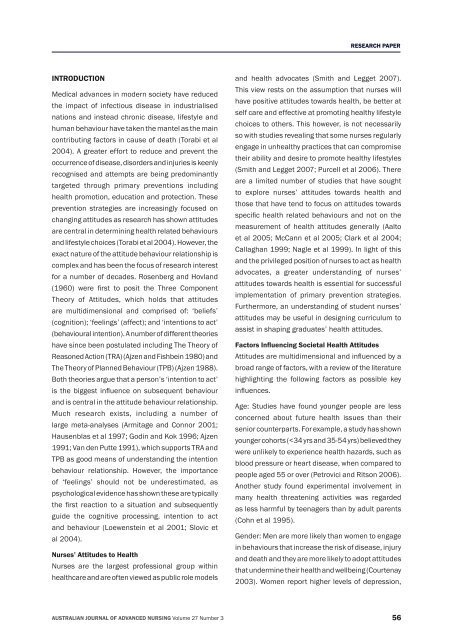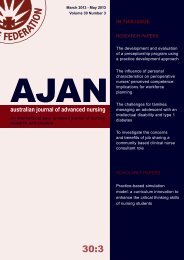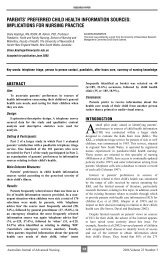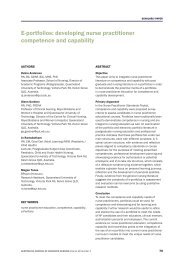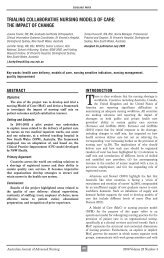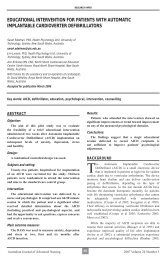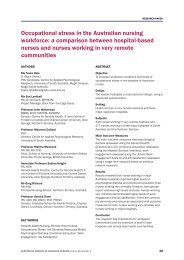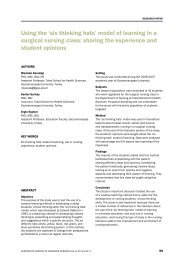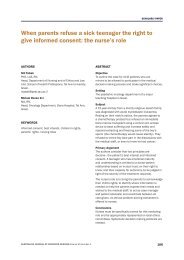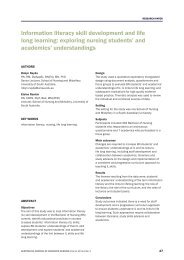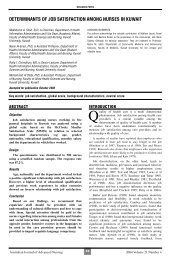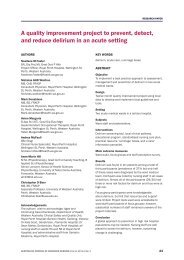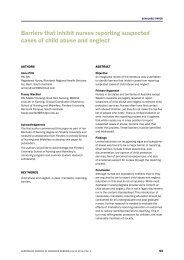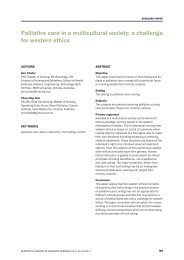March-May, 2010 - Australian Journal of Advanced Nursing
March-May, 2010 - Australian Journal of Advanced Nursing
March-May, 2010 - Australian Journal of Advanced Nursing
You also want an ePaper? Increase the reach of your titles
YUMPU automatically turns print PDFs into web optimized ePapers that Google loves.
RESEARCH PAPER<br />
INTRODUCTION<br />
Medical advances in modern society have reduced<br />
the impact <strong>of</strong> infectious disease in industrialised<br />
nations and instead chronic disease, lifestyle and<br />
human behaviour have taken the mantel as the main<br />
contributing factors in cause <strong>of</strong> death (Torabi et al<br />
2004). A greater effort to reduce and prevent the<br />
occurrence <strong>of</strong> disease, disorders and injuries is keenly<br />
recognised and attempts are being predominantly<br />
targeted through primary preventions including<br />
health promotion, education and protection. These<br />
prevention strategies are increasingly focused on<br />
changing attitudes as research has shown attitudes<br />
are central in determining health related behaviours<br />
and lifestyle choices (Torabi et al 2004). However, the<br />
exact nature <strong>of</strong> the attitude behaviour relationship is<br />
complex and has been the focus <strong>of</strong> research interest<br />
for a number <strong>of</strong> decades. Rosenberg and Hovland<br />
(1960) were first to posit the Three Component<br />
Theory <strong>of</strong> Attitudes, which holds that attitudes<br />
are multidimensional and comprised <strong>of</strong>: ‘beliefs’<br />
(cognition); ‘feelings’ (affect); and ‘intentions to act’<br />
(behavioural intention). A number <strong>of</strong> different theories<br />
have since been postulated including The Theory <strong>of</strong><br />
Reasoned Action (TRA) (Ajzen and Fishbein 1980) and<br />
The Theory <strong>of</strong> Planned Behaviour (TPB) (Ajzen 1988).<br />
Both theories argue that a person’s ‘intention to act’<br />
is the biggest influence on subsequent behaviour<br />
and is central in the attitude behaviour relationship.<br />
Much research exists, including a number <strong>of</strong><br />
large meta‐analyses (Armitage and Connor 2001;<br />
Hausenblas et al 1997; Godin and Kok 1996; Ajzen<br />
1991; Van den Putte 1991), which supports TRA and<br />
TPB as good means <strong>of</strong> understanding the intention<br />
behaviour relationship. However, the importance<br />
<strong>of</strong> ‘feelings’ should not be underestimated, as<br />
psychological evidence has shown these are typically<br />
the first reaction to a situation and subsequently<br />
guide the cognitive processing, intention to act<br />
and behaviour (Loewenstein et al 2001; Slovic et<br />
al 2004).<br />
Nurses’ Attitudes to Health<br />
Nurses are the largest pr<strong>of</strong>essional group within<br />
healthcare and are <strong>of</strong>ten viewed as public role models<br />
and health advocates (Smith and Legget 2007).<br />
This view rests on the assumption that nurses will<br />
have positive attitudes towards health, be better at<br />
self care and effective at promoting healthy lifestyle<br />
choices to others. This however, is not necessarily<br />
so with studies revealing that some nurses regularly<br />
engage in unhealthy practices that can compromise<br />
their ability and desire to promote healthy lifestyles<br />
(Smith and Legget 2007; Purcell et al 2006). There<br />
are a limited number <strong>of</strong> studies that have sought<br />
to explore nurses’ attitudes towards health and<br />
those that have tend to focus on attitudes towards<br />
specific health related behaviours and not on the<br />
measurement <strong>of</strong> health attitudes generally (Aalto<br />
et al 2005; McCann et al 2005; Clark et al 2004;<br />
Callaghan 1999; Nagle et al 1999). In light <strong>of</strong> this<br />
and the privileged position <strong>of</strong> nurses to act as health<br />
advocates, a greater understanding <strong>of</strong> nurses’<br />
attitudes towards health is essential for successful<br />
implementation <strong>of</strong> primary prevention strategies.<br />
Furthermore, an understanding <strong>of</strong> student nurses’<br />
attitudes may be useful in designing curriculum to<br />
assist in shaping graduates’ health attitudes.<br />
Factors Influencing Societal Health Attitudes<br />
Attitudes are multidimensional and influenced by a<br />
broad range <strong>of</strong> factors, with a review <strong>of</strong> the literature<br />
highlighting the following factors as possible key<br />
influences.<br />
Age: Studies have found younger people are less<br />
concerned about future health issues than their<br />
senior counterparts. For example, a study has shown<br />
younger cohorts (


